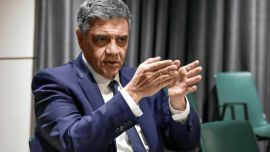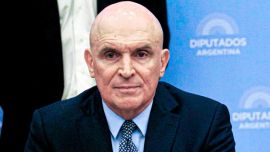PRO infighting has its corollary in Radicalism, perhaps less belligerent but equally divided as reflected in the running-mates of Horacio Rodríguez Larreta and Patricia Bullrich.
Gerardo Morales, who will accompany Rodríguez Larreta, is the Unión Cívica Radical national party chairman and, as such, can deploy allies in every province. To reach that post the votes of convention delegates nationwide were needed.
Luis Petri is younger with a short track record at national level but is more famous in his native Mendoza. Last June 11 he competed in the provincial PASO primaries against Alfredo Cornejo and although defeated, he was recognised as running a strong election.
How did they get to these new heights? Morales has had his ups and downs with Rodríguez Larreta. In the 2021 midterms when he supported neurosurgeon Facundo Manes, who harshly criticised the Buenos Aires City Mayor, Morales defined Rodríguez Larreta in an interview as “the fat boy of the neighbourhood who walks away with the ball.”
In late 2021 Morales became the new chairman of the UCR national committee, squaring off with Senator Martín Lousteau, with whom he almost came to blows. But the present is the reverse of all that past. Morales is at odds with Manes and friends with Lousteau. With Rodríguez Larreta the relationship could not be better and both are working to win the PASO primaries. An unimaginable scenario two years ago.
Luis Petri’s track record is less dizzy. Last year he served notice of his gubernatorial candidacy, deciding to make it official last February. The following month he also made official his engagement to television and radio journalist Cristina Pérez, embarking on his provincial campaign. Following his defeat, Patricia Bullrich invited him to be her running-mate.
In his favour, Petri complements Bullrich on security issues. In Mendoza the so-called ‘Ley Petri’ prohibits parole for sex offenders. His political godfather is Julio César Cleto Cobos, Cristina Fernández de Kirchner’s former vice-president and the author of the famous phrase: “My vote is not positive,” delivered when voting against the sliding scale for grain export duties in 2008.
The choice surprised Radical sectors who had identified Alfredo Cornejo as Bullrich’s Mendoza ally. There was even speculation as to who her running-mate might be after the pair went campaigning in Greater Buenos Aires together. To add context, Cobos and Cornejo are adversaries in Mendoza. Cornejo has now decided to remain neutral with both presidential hopefuls capping the same slate for Congress. But at heart he sides with Patricia.
Choosing weapons
Both PRO presidential hopefuls lack structures inland, which are supplied by the Radicals. Nationwide their allies are the Radical governors or the provincial party leaders. Besides Jujuy Governor Morales and Mendoza’s Cornejo, there is Corrientes Governor Gustavo Valdés, to whom should be added San Luis governor-elect, Claudio Poggi, of Peronist origin but allied to Rodríguez Larreta.
Apart from Morales, Rodríguez Larreta is backed by Lousteau, also adding San Isidro Mayor Gustavo Posse at the closure of the lists. Apart from Mendoza’s Petri, Patricia Bullrich has Buenos Aires Province party chairman Maximiliano Abad and Santa Fe gubernatorial hopeful Carolina Losada, opposed locally by fellow-Radical Maxi Pullaro, who responds to Morales and Rodríguez Larreta.
The strategies in Buenos Aires Province differ. Rodríguez Larreta has opted for the most populous districts while Patricia Bullrich has decided to go hunting votes in the hinterland whose demography is less dense but it is a territory neglected by PRO with a much greater Radical presence.
Of the 135 municipalities, Bullrich is allied to 33 Buenos Aires Province mayors while Rodríguez Larreta has only managed to draw 19 but in terms of voters his allied municipalities are more populous, representing over 1.9 million votes as against 1.7 million for Bullrich. The district of a mayoral ally of Rodríguez Larreta with the most voters is the provincial capital of La Plata with 600,000 eligible to vote while the most populous of Bullrich is Lanús with 400,000.
The lists of Rodríguez Larreta and Bullrich have different names. The City Mayor’s list is called El Cambio de Nuestras Vidas (“Changing our Lives”) and carries the letter ‘A’ while Bullrich’s is named La Fuerza del Cambio (“The Force of Change”) with a ‘B’ for Bullrich. In most of the country they will run with totally different lists, only managing to unify them in a few provinces such as Mendoza, Corrientes, Entre Ríos, Chubut and Chaco. But that unification responds more to the weight of local candidates than to any agreement between the presidential hopefuls.
The construction of candidacies revolves around raising the highest possible floor. And that floor can only come from Radicalism with a greater territorial presence, which explains the presence of two Radical running-mates in the same primary.a

























Comments